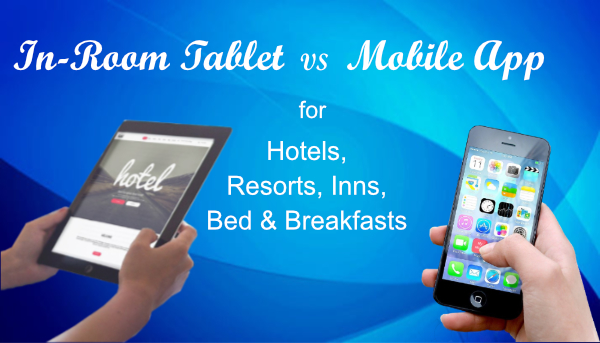.
.
Which is better for your hospitality property, an in-room tablet or a mobile app?
Stay with me and I will help you decide.
Welcome to another edition of Hospitality Property School.
I am your instructor, Gerry MacPherson
.
There is no doubt that in recent years the hospitality property customer service experience has changed considerably. In the not too distant past, often the only contact a guest would have with a property was telephone or face to face.
This would hopefully built trust, loyalty to a brand and the personal touch.
In the last few years, a new type of guest has emerged.
.
- Online sources play an integral part of this customers booking experience and planning with 66% of travellers watching travel-related videos before booking their trip.
- 51% of travellers use online sources to decide on activities once at their destination, meaning that offering online solutions either in guest rooms, lobby area and good Wi-Fi facilities have become an important aspect of a guest’s stay.
.
This new customer is not looking for good customer service, but a full “guest experience”.
New technology is playing a big role with online and tablet check-ins reducing check-in times. Smart rooms with room service ordering facilities, personalised welcome messages on screens, and fast Wi-Fi & broadband, so guests can connect as easily as they would at home.
The hospitality property industry is undergoing a technological revival and the race to provide effective digital solutions for in-room guest communication has yielded a range of innovative approaches.
.
Two of the major front-runners are:
- App-based solutions for smartphones
.
- Integrated tablet solutions that come ready to use as part of the property room
.
.
The digital guest
The hospitality property guest of today is more connected than ever before, and even those from demographics that were once considered technophobes are adopting mobile technology surprisingly quickly.
The widespread adoption of digital technology has meant hospitality property owners and managers have no choice but to take note of this change and adapt their services to meet the evolving demands of their guests.
.
.
The differences between app-based and in-room integrated tablet solutions
Both these solutions allow guests easy access to the offers and services of a property through a digital interface. In turn, they provide property owners with a centralized platform through which they can present the range of services on offer at their establishment.
The main difference between the two is that an app needs to be downloaded onto a guest’s device while an in-room tablet solution is a standalone device that requires no registration or process of downloading.
.
.
The downside of app-based solutions
The major downside of app-based solutions is that the user needs to perform certain actions before they are even able to use the app. As usage will never be 100%, this naturally restricts the proportion of guests that will use this platform.
.
Think of this example:
These numbers are based on an article by Hotel Tech Report.
Out of the 100 guests at your property, only 80 of them own smartphones or tablet devices, you’re already limiting the number of guests that can communicate through the platform.
Out of the remaining 80, maybe that only 40 download the app due to factors such as the ineffectiveness of advertising, the low uptake rate of mobile apps in general, and potential technical issues or misunderstandings that can occur.
Left with only 40 of the original 100 potential users able to log into the platform. Of these, it’s unlikely that a significant number, possibly as low as 5%, or 2 out of the original 100, will fully explore the app and its potential, let alone be convinced enough to follow up on a call to action!
In addition to the percentage problem, there’s also the challenge of motivating guests to use an app once it’s been downloaded. According to Localytics, 69% of apps that are downloaded are rarely or never used, and around a quarter are only opened one time after they are downloaded.
.
This is a statistic that also applies to the hospitality property industry.
.
This breakdown shows how, by investing in an app-based solution that promises to deliver a great service for your guests, you may be limiting potential reach.
In contrast, an in-room integrated tablet-based solution will reach everyone who enters the room, whether they have a smartphone or tablet device, or not. Also, features that require guests to interact with the device such as room controls, integrated TV controls, and information about the property will invite guests to use the device during their stay.
These features will encourage guests to use the platform to buy items or order paid-for services through the shop, restaurant, or other channels that allow you the benefit of upselling.
The advantage of an in-room tablet is its passiveness. It doesn’t invade the guest’s personal “digital space” by taking up room on their mobile device.
By acting as a central control platform for guests, a tablet is inviting rather than invasive, meaning that potential users will feel welcome when using it and therefore more likely to want to engage, rather than feeling forced to do so.
.
.
Choosing the best solution for your property
When looking for an in-room guest communication platform, it’s important to understand the likelihood of it being used.
The low uptake frequency, the necessity for guests to have a mobile device, and the potential barriers during the downloading phase are all hurdles that need to be overcome for a mobile app to reach its target audience. The culmination of these factors greatly limits its potential use and therefore the opportunity to provide a first-class service and make additional sales.
Specifically designed and integrated in-room tablet solutions bypass these issues, allowing customers the freedom to explore what your property has to offer without needing to download an app. It allows them to use the device at their leisure and means everyone that visits your property will receive the same great service, without requiring their mobile device, every time they check-in!
However, with new technology there comes new challenges. When technology works well, it gives a great impression, but behind the scenes, the property owner does have some work to do to make this smooth transition.
- Expensive investment in technology, properties want to make sure the devices are kept safe.
.
- Properties want to ensure devices are fully charged and ready for use at all times.
.
- That all the materials and resources the property is using is tablet friendly
.
- That the customer can connect quickly to the internet or Wi-Fi
.
- The properties website integrates well with the tablet format
.
- That the staff can use the tablets quickly and efficiently
.
- That they trained to do so, and it meets their skillset
.
.
In conclusion
Hospitality properties need to adapt to this new customer by embracing technology, its challenges, and aiming to recreate a personal guest interaction within the property environment.
Device management will play a critical role in the future of digital technology, and the future of hospitality property interiors, as technology shapes the new guest experience for the new type of customer.
.
.
Are you currently using or considering property apps or in-room tablets?
Let me know in the comment section.
.
.
If you are a member of the Hospitality Property School Group, I have included in this week’s updated episode, ways you can benefit from in-room technology.
.
*Some of the information in this post came from a post written by Gregor Herz of SuitePad
.
.
⇒ TO READ OR LISTEN TO THIS EPISODE ON KEYSTONE HOSPITALITY PROPERTY CONSULTING:
https://keystonehpd.com/KHDC187
Join one of our private groups
https://keystonehpd.com/private-groups
Say hi on social:
Facebook: https://www.facebook.com/KeystoneHDC
Twitter: https://twitter.com/KeystoneHDC
Linkedin: https://www.linkedin.com/company/keystone-hospitality-development
.
.
Listen to The Hospitality Property School PODCAST here:
https://keystonehpd.com/itunes-podcast
https://www.spreaker.com/keystonehdc
.
.
YouTube
.
.
A Division of Keystone Hospitality Development Consulting






